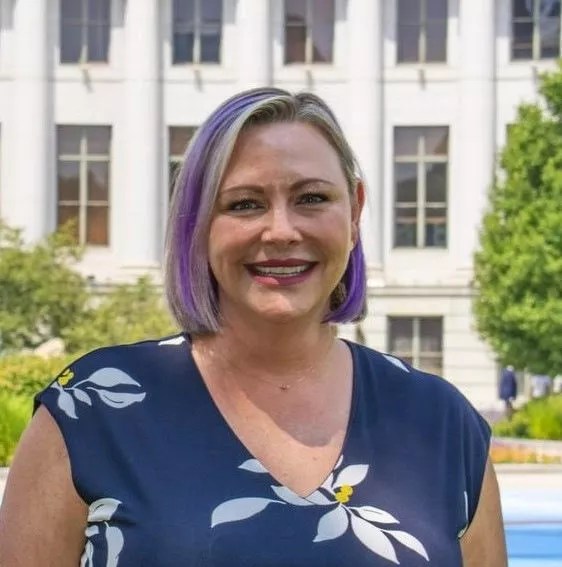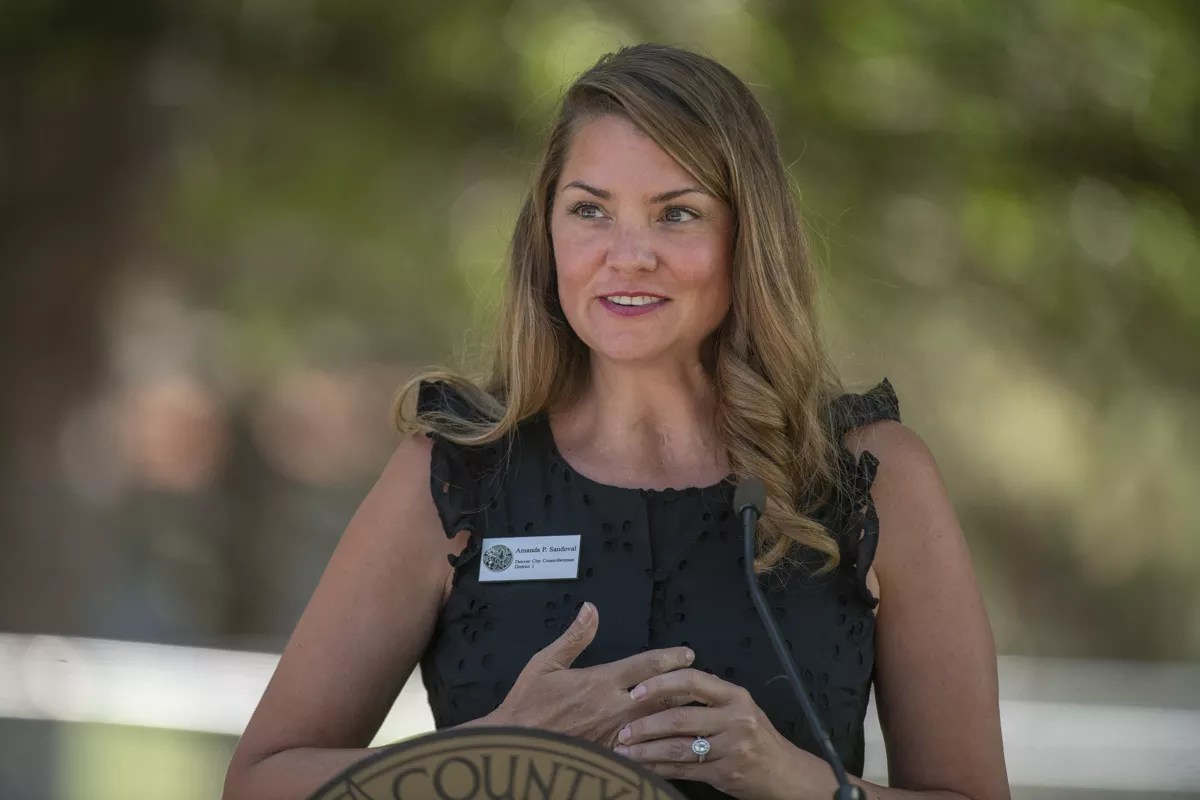
denvergov.org

Audio By Carbonatix
Denver City Council members Amanda Sandoval and Amanda Sawyer have reintroduced the idea of decreasing city term limits from three to two terms, much to the surprise of many other members of council.
The pair initiated the discussion in August 2023, saying many of their constituents had brought it up on the campaign trail. At that time, other members expressed concern with the idea and believed the topic to be closed.
“Last August, I thought the conversation was complete,” Councilman Chris Hinds said during a May 20 Charter Review Committee meeting. “I haven’t heard anything from constituents about council term limits.”
Sandoval and Sawyer did not believe the discussion was over last year, however. The two have spent the last eight months polling Denver voters and researching local policy in other large cities across the country. Now they have an official proposal to amend city charter policy and cut term limits from three consecutive four-year terms to two terms for the mayor, city councilmembers, clerk and recorder, and auditor.
The change would bring Denver into accord with the state government, where elected officials can serve only eight consecutive years. Sawyer and Sandoval’s proposal would start in 2027, and anyone currently in office would be able to serve for twelve years, including the proposal’s sponsors (who are both in their second term). Voters would have to approve the idea if Denver City Council referred it to the ballot.
Colorado didn’t have term limits until 1995, when voters approved a statewide constitutional amendment to set terms for elected officials at eight years. In 2000, a Denver-specific ballot measure increased the amount to twelve years, or three consecutive terms, for city offices.
In other large cities across the United States, most local governments have no term limits or a limit of two terms, according to Sandoval and Sawyer’s research.
Public Support for Shorter Terms in Denver
Sandoval said much has changed in the years since term limits were last updated in 2000, including population growth. In Denver, councilmembers serve an average of 76,000 more people in their districts nowadays.
“There was no Twitter,” she said during the committee meeting. “There was no Facebook. There was no Instagram. I don’t even know if they had the worldwide web. I think they barely maybe had email and people did faxes. … I don’t even think we had as much workload as we have now.”

Councilwoman Amanda Sawyer is one of two members behind the proposal.
Denver.gov
Sawyer said neither she nor Sandoval feel strongly about the proposal one way or the other, but wanted to honor the many requests from their constituents.
Last August, their fellow councilmembers said more data about what people across the city wanted was needed. To investigate, the two councilwomen commissioned Magellan Strategies to conduct a text message survey of likely 2024 voters in all council districts; it cost $29,000.
“We just wanted to make sure that we were hearing from the residents of Denver in a way where it was not a city council office doing the research,” Sandoval said. “Because oftentimes, as a councilmember, when you’re doing the research, people think you have a pre-determined outcome.”
In survey responses, over 70 percent of voters said they would vote to reduce terms from three to two for the mayor, over 69 percent said the same for city councilmembers, and over 60 percent for the clerk and recorder and the auditor.
In each council district, a majority of voters approved of the proposal, as well. The lowest rate of approval came in at 52 percent in districts 10, 8 and 7. The district most in favor was District 11, at 75 percent. Sandoval also mentioned a Colorado Polling Institute poll conducted in August 2023 that found that 63 percent of voters support the idea.
Councilmember Stacie Gilmore, whose district registered the highest support, said she has never heard of a desire for decreased term limits from constituents. She said she actually hears the opposite from people, who wish she could stay in office longer.
Gilmore thought the survey was a scam when she received a text about it. Hinds said the same, noting that his constituents asked if the survey was real and said they found the questions confusing.
“After that August committee meeting, I thought that this conversation was done,” Gilmore said. “I was really surprised when, about two and a half weeks ago, I got a text message that was a survey that had the city council logo on it.”
She asked why Sandoval and Sawyer hadn’t informed the rest of council that they were developing the survey or planned to send it out, or consulted fellow councilmembers about the survey’s contents. Sandoval apologized for the lack of communication and promised to do better in the future; she said the questions were meant to show both pros and cons and not be slanted any particular way.
Regardless of the survey results, every councilmember who spoke outside of Sandoval and Sawyer expressed opposition to reducing term limits.
Objections to Term Limit Reductions
“I have a suspicion if you put a ballot measure on the November ballot suggesting we should abolish the Denver City Council, that would have a good chance of getting 50 percent,” Councilmember Kevin Flynn said. “That doesn’t mean it’s a good idea.”
Flynn argued that a city council in a strong-mayor government like Denver’s needs extra term years to be strong enough to push back on powerful mayors. In the August 2023 discussion, Councilmember Serena Gonzales-Gutierrez said that during her time as a state legislator, having less experienced lawmakers meant lobbyists had a stronger influence, too.
“I know one of the biggest transition hurdles for newly electeds is moving from campaign mode into good governance,” Gilmore said at the May 20 meeting, agreeing with Flynn that popular campaign requests aren’t necessarily good ideas. Sandoval disagreed.

Amanda Sandoval said her constituents deserve a voice in the term limit discussion
Evan Semón
“When I run, I take ideas from the campaign trail and implement them,” Sandoval replied, citing her legislation on changing the name of La Raza Park and implementing a new design overlay on Tennyson Street. “This is something that I didn’t solicit. When I was campaigning, people asked me: Will you consider this when you join your second term? Would you consider changing the term limits? And I said yes.”
Sandoval added that not every idea her constituents bring her passes into law, but she feels it’s responsible to pursue them. In this case, she probably won’t have the support needed.
Other councilmembers expressed worries that with shorter terms, less important work would get done, because it takes a while for new councilors to get up to speed.
“I may not be the brightest bulb in the chandelier, but it was probably toward the end of my first term where I started feeling like, ‘Hey, I kind of know how this operates a little bit,'” Councilmember Paul Kashmann said.
Now that he’s in his third term, Kashmann feels that he and his staff are better prepared than ever to craft legislation. Hinds, who’s in his second term, described getting up to speed on the job as a “learning cliff.”
Flynn doesn’t see third terms as a problem, noting that each iteration of council since 2000 has only an average of three members in their third term; this iteration has Flynn, Kashmann and Gilmore in their third terms.
Most councils since 2000 have been made up of members in their first terms, as is the case with the current batch, which has six freshman councilors along with four in their second terms and three on their final go.
First-term councilmember Darrell Watson pointed out that only twelve of the 41 people elected to city council since 2003 had served three terms – and if people don’t want someone to serve that long, they can vote them out.
“I believe three terms is the sweet spot for all city offices, including mayor, auditor and clerk,” Kashmann added. “None of us signs up for three terms. We sign up for four years, and the voters have their choice.”
Sandoval concluded by saying she thinks the council needs to have more conversations about the matter going forward, but no official hearings for term limits have been scheduled.